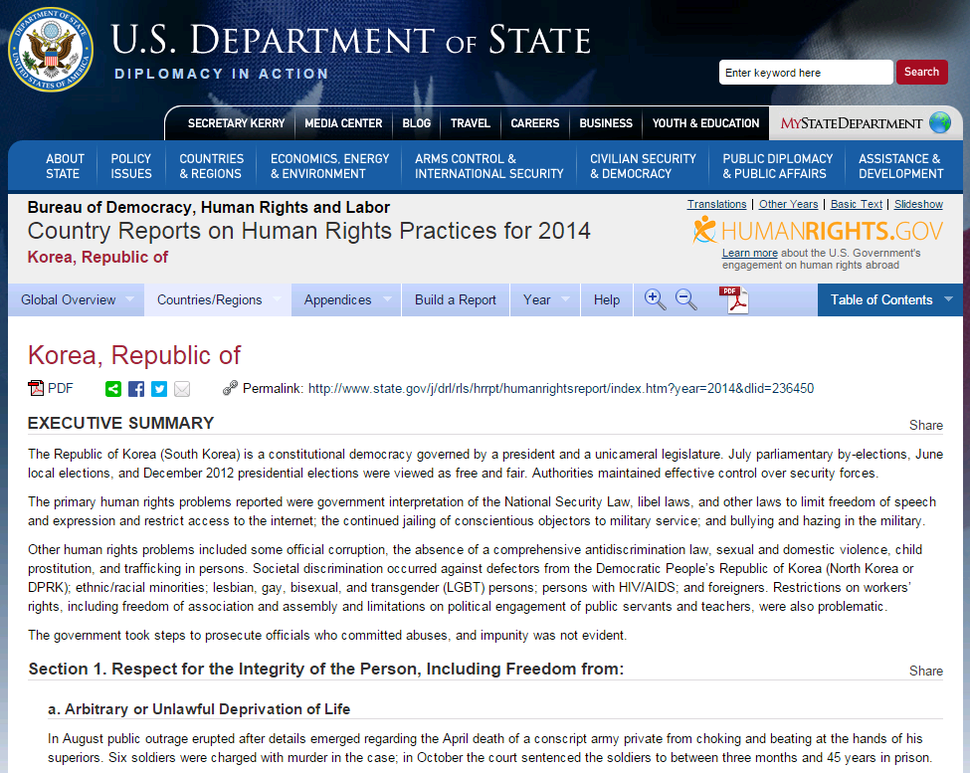hankyoreh
Links to other country sites 다른 나라 사이트 링크
US State Department cites human rights issues in S. Korean military and labor

An annual human rights report released on June 25 by the US State Department cited violence in the military and restrictions on political involvement by government employees and teachers as problem areas for South Korea.
The department’s Human Rights Report for South Korea rated it as a country that generally respects human rights, but included the two new areas in addition to previous concerns about the National Security Law.
“The primary human rights problems reported were government interpretation of the National Security Law, libel laws, and other laws to limit freedom of speech and expression and restrict access to the internet; the continued jailing of conscientious objectors to military service; and bullying and hazing [of new recruits] in the military,” the executive summary read.
The mention of bullying and hazing in the military appears to be a reference to incidences such as the death of a private first class surnamed Yun in Apr. 2014.
“During the first half of the year, the Ministry of National Defense reported 37 suicides among military personnel, generally attributed to bullying, hazing, or inability to adjust to military life,” the report said.
In regard to punishment in libel cases, the report mentioned the indictment of former New Politics Alliance for Democracy floor leader Park Jie-won after allegations that President Park Geun-hye used a “non-official system” to choose appointees.
In terms of press freedoms, the report mentions the indictment of the Japanese newspaper Sankei Shimbun’s Seoul bureau chief for defamation over allegations about President Park’s whereabouts during the Apr. 2014 Sewol ferry sinking.
While the State Department’s 2013 report had only mentioned restrictions on labor rights and interference with striking rights as problem areas, the latest report notes that “[r]estrictions on workers’ rights, including freedom of association and assembly and limitations on political engagement of public servants and teachers, were also problematic.”
Fact-based accounts were also provided on former National Intelligence Service director Won Sei-hoon being found guilty and the former director of the Ministry of National Defense Cyber Command being indicted over their organizations’ interference in the 2012 presidential election and political issues, along with the forgery of evidence in a high-profile espionage case involving a Seoul city official, the disbandment of the Unified Progressive Party, and the indictment of former lawmaker Lee Seok-ki for incitement to rebellion.
North Korea was described by the State Department as having a human rights record “among the worst in the world.” The wording was even stronger than previously chosen descriptors such as “poor,” “deplorable,” and “grim” - apparently a reflection of new details from a UN Commission of Inquiry on Human Rights (COI) report published in Feb. 2014.
The State Department noted the COI’s report of between 80,000 and 120,000 people incarcerated in North Korean prisons and political internment camps, a slightly lower figure than the 80,000 to 200,000 estimated in its 2013 report. The 2014 report cited the South Korea Institute for National Unification’s conclusion that “the decrease in the number of inmates from previous years might be the result of natural reduction from harsh circumstances rather than significant changes in government policy.”
Since the US Congress’s passage of the Foreign Assistance Act of 1961, the State Department has published yearly human rights reports with general assessments of human rights conditions, freedoms, and corruption in countries around the world. The information is used as a reference in foreign policy decisions by the administration and Congress. The first draft is made by overseas diplomats from sources such as government officials, news outlets, and human rights activists in the country, after which the State Department’s Bureau of Democracy, Human Rights and Labor performs a final summary and analysis and receives additional expert advice.
By Park Hyun, Washington correspondent
Please direct questions or comments to [english@hani.co.kr]

Editorial・opinion
![[Column] Season 2 of special prosecutor probe may be coming to Korea soon [Column] Season 2 of special prosecutor probe may be coming to Korea soon](https://flexible.img.hani.co.kr/flexible/normal/500/300/imgdb/original/2024/0426/3317141030699447.jpg) [Column] Season 2 of special prosecutor probe may be coming to Korea soon
[Column] Season 2 of special prosecutor probe may be coming to Korea soon![[Column] Park Geun-hye déjà vu in Yoon Suk-yeol [Column] Park Geun-hye déjà vu in Yoon Suk-yeol](https://flexible.img.hani.co.kr/flexible/normal/500/300/imgdb/original/2024/0424/651713945113788.jpg) [Column] Park Geun-hye déjà vu in Yoon Suk-yeol
[Column] Park Geun-hye déjà vu in Yoon Suk-yeol- [Editorial] New weight of N. Korea’s nuclear threats makes dialogue all the more urgent
- [Guest essay] The real reason Korea’s new right wants to dub Rhee a founding father
- [Column] ‘Choson’: Is it time we start referring to N. Korea in its own terms?
- [Editorial] Japan’s rewriting of history with Korea has gone too far
- [Column] The president’s questionable capacity for dialogue
- [Column] Are chaebol firms just pizza pies for families to divvy up as they please?
- [Column] Has Korea, too, crossed the Rubicon on China?
- [Correspondent’s column] In Japan’s alliance with US, echoes of its past alliances with UK
Most viewed articles
- 1Is Japan about to snatch control of Line messenger from Korea’s Naver?
- 2‘We must say no’: Seoul defense chief on Korean, USFK involvement in hypothetical Taiwan crisis
- 3[News analysis] Using lure of fame, K-entertainment agency bigwigs sexually prey on young trainees
- 4Will NewJeans end up collateral damage in internal feud at K-pop juggernaut Hybe?
- 5‘Weddingflation’ breaks the bank for Korean couples-to-be
- 6No good, very bad game for Korea puts it out of Olympics for first time since 1988
- 7AI is catching up with humans at a ‘shocking’ rate
- 8“Korea is so screwed!”: The statistic making foreign scholars’ heads spin
- 9The dream K-drama boyfriend stealing hearts and screens in Japan
- 10[Column] The clock is ticking for Korea’s first lady